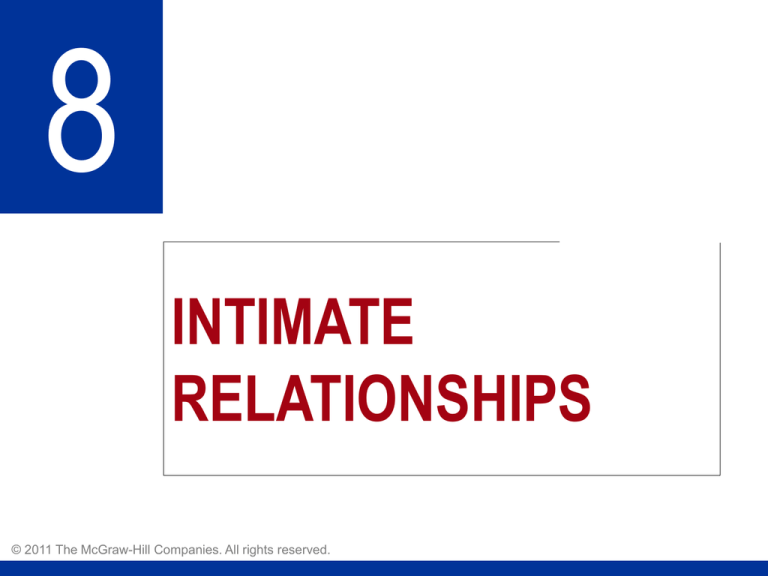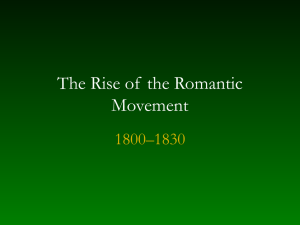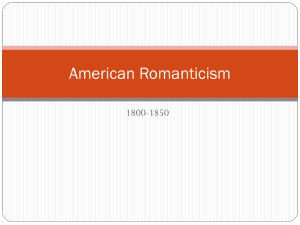
8
INTIMATE
RELATIONSHIPS
© 2011 The McGraw-Hill Companies. All rights reserved.
[What’s To Come
» The Nature of Intimate Relationships
» Characteristics of Romantic Relationships
» Forming and Communicating in Romantic
Relationships
» Communicating in Families
» Improving Communication in Intimate
Relationships
[The Nature of Intimate Relationships
» Intimate
relationships require
deep commitment
• Commitment is the
desire to stay in a
relationship no
matter what happens
[The Nature of Intimate Relationships
[The Nature of Intimate Relationships
[The Nature of Intimate Relationships
» Intimate relationships require deep
commitment
• Commitment takes several forms
» Emotional commitment
» Social commitment
» Legal commitment
» Financial commitment
[The Nature of Intimate Relationships
» Intimate relationships require deep
commitment
What do you think about
pre-nuptual agreements?
How would you react if your
partner asked for a pre-nup
before saying “I do”?
[The Nature of Intimate Relationships
» Intimate relationships foster
interdependence
• What happens to one person affects everyone
else in the relationship
• Intimate relationships usually have high
interdependence
[The Nature of Intimate Relationships
» Intimate relationships
require continuous
investment
• Investment is the
commitment of
resources to a
relationship
• People in intimate
relationships are often aware
of how much they invest
[The Nature of Intimate Relationships
» Intimate relationships spark dialectical
tensions
• Dialectical tensions are conflicts between two
important but opposing needs
» Autonomy versus connection
» Openness versus closedness
» Predictability versus novelty
» Spontaneity versus planning
Characteristics of Romantic
Relationships
[
» Some romantic relationships emphasize
exclusivity
• Monogamy means being in only one
romantic relationship at a time and avoiding
romantic involvement with others outside the
relationship
• Infidelity means having romantic interaction
with someone outside of one’s “committed”
romantic relationship
Characteristics of Romantic
Relationships
[
» Most romantic relationships attempt to
emphasize voluntariness
• Many people expect to choose for themselves
whether to be romantically involved, and with
whom
• Some cultures still have “arranged marriages”
• Even if people enter a romantic relationship
voluntarily, they do not always stay in it
voluntarily
Characteristics of Romantic
Relationships
[
» Some romantic relationships
emphasize love
• Much of the Western world
thinks of romantic relationships
as being based on love
• People sometimes enter
romantic relationships for
financial stability or power
Characteristics of Romantic
Relationships
[
» Same- and oppositesex romantic
relationships
• Both types of
relationships
communicate similarly
• Same-sex romantic
relationships are not
legally recognized in
most of the world
Acceptance is Growing for SameSex Marriages
[
June 24, 2011, Governor Andrew Cuomo
signs into law the Marriage Equality Acct
Characteristics of Romantic
Relationships
[
» Expectations for
romantic relationships
vary around the world
• Expectations for
exclusiveness
• Expectations for
voluntariness
• Expectations for love
• Expectations for
sexuality
Forming and Communicating in
Romantic Relationships
[
» Communications Scholar Mark Knapp’s
5-stage model of relationship development
•
•
•
•
•
Initiating
Experimenting
Intensifying
Integrating
Bonding
♥
» Stages can vary across cultures and online
Forming and Communicating in
Romantic Relationships
[
» Romantic relationships vary in how they
handle conflict
“(Conflict is) an expressed struggle between
at least two interdependent parties who
perceive incompatible goals, scarce
resources, and interference from the other
party in achieving their goals”
~ William Wilmot and Joyce Hocker
Communications Scholars
Forming and Communicating in
Romantic Relationships
[
» Romantic relationships vary in how they
handle conflict
• Validating couples discuss disagreements openly and
cooperatively
• Volatile couples discuss disagreements openly but
competitively
• Conflict-avoiding couples discuss disagreements
covertly rather than openly (ie. passive-aggressive)
• Hostile couples have frequent, intense conflict
Forming and Communicating in
Romantic Relationships
[
» Romantic relationships vary in how they
handle privacy
The Communication Privacy Management
Theory (Sandra Petronio, communications
scientist)
» Partners in a couple jointly own the information about
their relationship
» We form and manage privacy boundaries
Forming and Communicating in
Romantic Relationships
[
» Romantic relationships vary in how they
handle emotional communication
• Happy partners share more positive emotion
and less negative emotion than do unhappy
partners
• Unhappy partners are more likely than happy
partners to reciprocate expressions of negative
emotion
Forming and Communicating in
Romantic Relationships
[
» Romantic relationships vary in how they
handle emotional communication
• Happy partners share more positive emotion
and less negative emotion than do unhappy
partners
• Unhappy partners are more likely than happy
partners to reciprocate expressions of negative
emotion
• “I hate you.” “I hate you, too”
Forming and Communicating in
Romantic Relationships
[
» Romantic relationships
vary in how they handle
instrumental
communication
• Day-to-day tasks require
completion
• The way in which partners
divide everyday tasks often
reflects the balance of
power in their relationship
Forming and Communicating in
Romantic Relationships
[
» Knapp’s five-stage model of relationship
dissolution
•
•
•
•
•
Differentiating
Circumscribing
Stagnating
Avoiding
Terminating
[Communicating in Families
» What makes a
family?
• Genetic ties
• Legal obligations
• Role behaviors
[Communicating in Families
» Families come in
various types
• Family of origin
• Family of
procreation
• Nuclear family
• Blended family
• Single-parent family
[Communicating in Families
» Families enact roles
• Family roles are the functions people serve in
the family system
• Four roles commonly emerge during conflict
» Blamer
» Placater
» Computer
» Distracter
[Communicating in Families
» Families enact rituals
• Family rituals are repetitive activities that have
special meaning for a family
• Some family rituals are “imported” from families
into blended families
[Communicating in Families
» Families tell stories
• Family stories give families a sense of their
history, their expectations, and their connections
• Family web pages often embody a family’s
stories
[Communicating in Families
» Families share
secrets
• Some families have
secrets they
intentionally keep
hidden from others
• Secrets can also be
kept within families
Improving Communication in
Intimate Relationships
[
» Emphasize
excitement and
positivity
• Sharing common,
enjoyable activities
increases relationship
satisfaction
• Using confirming
messages emphasizes
positivity
Improving Communication in
Intimate Relationships
[
» Handle conflict
constructively
• Four conflict
behaviors are
especially
destructive
» Criticism
» Contempt
» Defensiveness
» Stonewalling
Improving Communication in
Intimate Relationships
[
» Have realistic expectations
• No one person—not even a spouse—can
meet all of your social and emotional needs
• Remember that the important people in your
life are important for different reasons
Improving Communication in
Intimate Relationships
[
» Manage dialectical tensions
• Eight strategies for managing tensions
» Denial
» Disorientation
» Alternation
» Segmentation
» Balance
» Integration
» Recalibration
» Reaffirmation
[For Review
» What makes some relationships intimate?
» How do we form, maintain, and dissolve
romantic relationships?
» What makes a family, and how do we
communicate in families?










